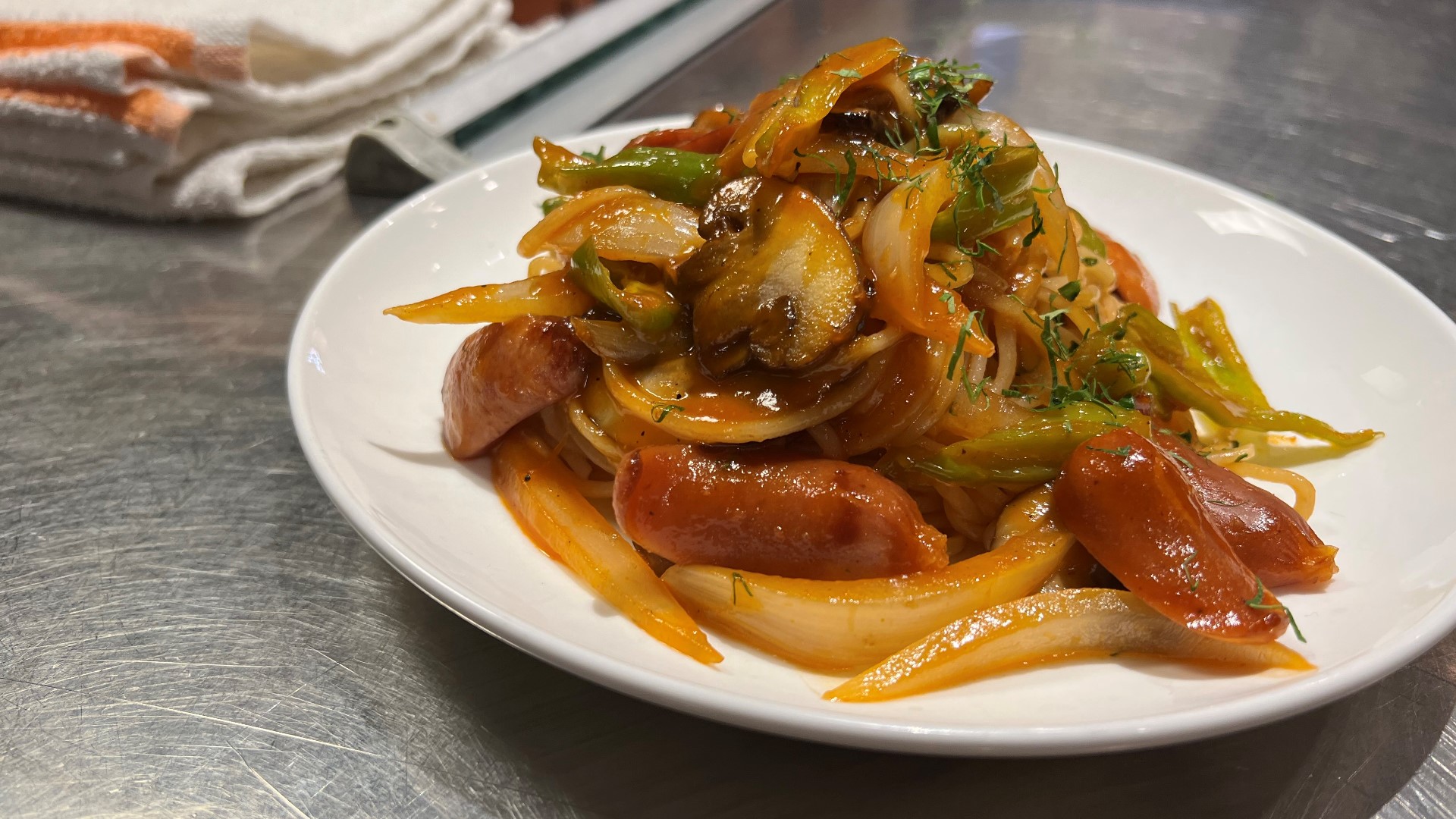WASHINGTON — Tonari, the latest restaurant from the Daikaya Group, is on a mission. But its mission didn’t start where you might expect.
The folks behind Daikaya own several ramen shops spread out across the District, including its namesake ramen shop (with Izakaya upstairs) Bantam King fried chicken and ramen, Hatoba and Haikan.
Tonari is right next door to Daikaya, and around the corner from Bantam King. But for the group’s next act, they didn’t want to open another ramen shop.
To hear Daikaya co-owner Daisuke Utagawa explain it, when they walked into the space that would become Tonari, they knew what they had to do.
The concept for Tonari is wafu Italian cuisine.
“The word wafu means Japanese-style,” Daisuke explained. “Normally it means something that is not originally Japanese that is done in Japanese style.”
Daisuke says Tonari’s wafu Italian is not a new style of cuisine, but it is something that is new to D.C., and new to the United States.
“Wafu Italian is not something we invented," Daisuke said. "It’s something that exists in Japan, but it’s not well-known outside of Japan.”
Daisuke stresses that wafu Italian is a coming-together of cultures, rather than what some might call “fusion.”
“I personally don’t like the word fusion," he said. "Not because of what it means, but because of what the connotations are. There’s a difference between a natural cultural phenomenon of two things meeting and becoming something, almost organically, versus something that’s put together by force.”
That’s the mission behind Tonari: To educate people about the concept of wafu Italian cuisine. To show the history of two cuisines that came together naturally over the course of decades in Japan.
Wafu pasta dates back to the ‘50s with a restaurant whose name translates to “hole in the wall.” Daisuke said the reason that the use of Japanese ingredients in Italian cooking took off in Japan is that the two cultures share a similar approach to cuisine.

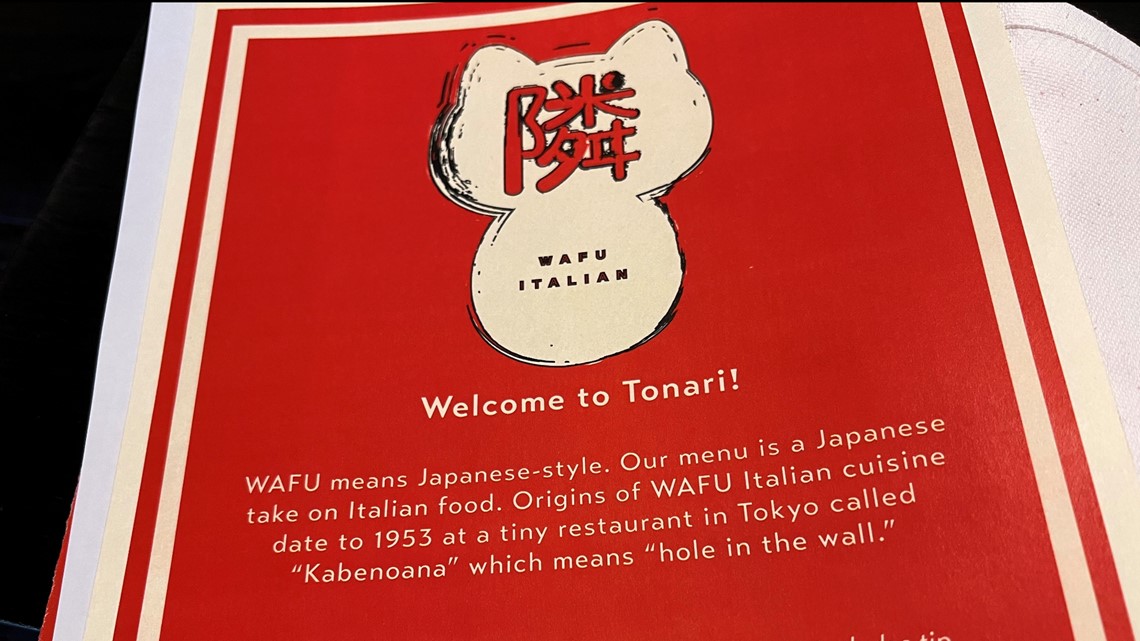
So why bring that style of cooking to D.C. diners?
“Here’s a simple answer for you,” Daisuke says, gesturing to a massive black pizza over at the center of the kitchen. “That oven.”
It was clear to the Tonari team that they wanted to use that huge oven in some respect. That’s where the concept of wafu pizza and pasta was born. But while wafu pasta had roots and history behind it, wafu pizza was something entirely new, and something that Daisuke and his partner dove into headfirst.
Having already established a ramen supplier in Sapporo, Japan through their other ventures, that supplier told them they also make pasta, and that they tasted different from any other pasta they could get because of how they’re made.
“They have this ramen technology and they applied it to pasta, and it’s a totally different thing,” Daisuke said.
Pizza was more work. Since there was no established wafu pizza, they had to start from the ground up.
“If we want to make wafu pizza, we have to define it," Daisuke said.
That sent Daisuke and his Daikaya partner Chef Katsuya Fukushima to Japan to develop a dough using inspiration from Japanese milk bread – what Daisuke calls Japanified Wonderbread.
“We went through iteration and iteration and iteration and what we came up with was like, ‘Oh my god, this is really cool," Daisuke said.
He said the whole process took about three months, through lots of back-and-forth and trial-and-error. They worked on everything from the components of the dough to the cooking vessel, to the temperature and timing before they settled on the dough.
What ends up on your plate at Tonari is something that looks like your average deep dish pizza, but tastes completely different. It’s crispy and crunchy, while being chewy and pillowy at the same time. It’s immensely craveable.

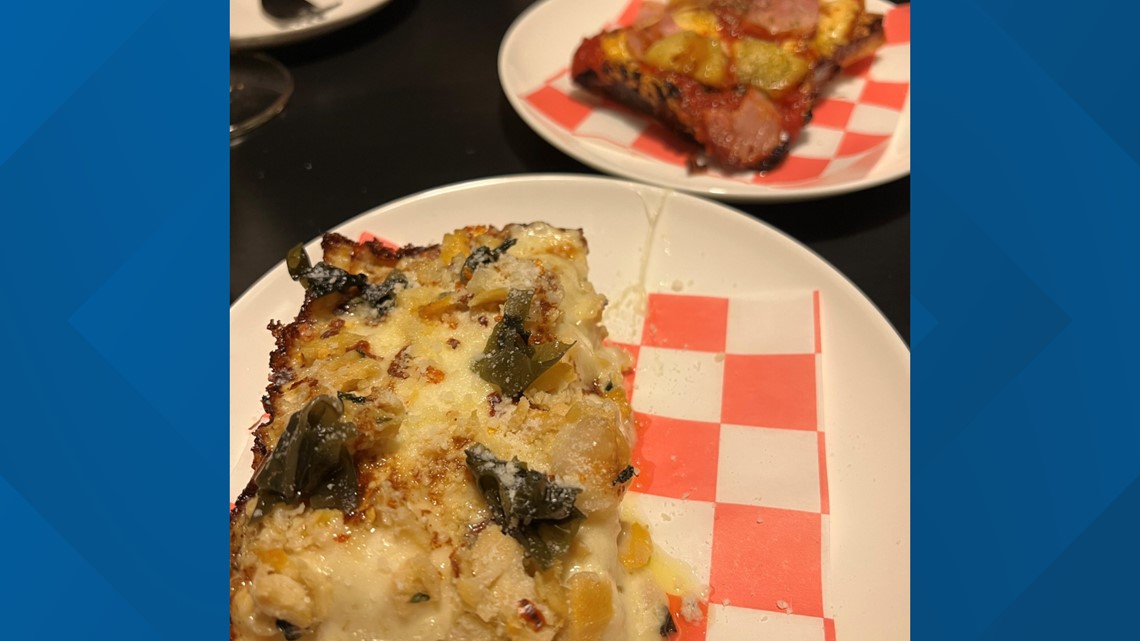
What pushed Daisuke and his partner to develop this new pizza? The short answer is the oven, but it goes deeper than that.
“There’s many ways to look at a restaurant. One is, you’re hungry, you're feeding people. But you can do that anywhere,” Daisuke said. “But when you’re going to a restaurant, you got to have an additional reason to go there. At the end of the day it’s a community, right? When you’re making a community you have to have ethos. The ethos to us is quite important. We’re in this every day. If we just do it because ‘Yeah, it’s a business,’ you kind of lose enthusiasm.”

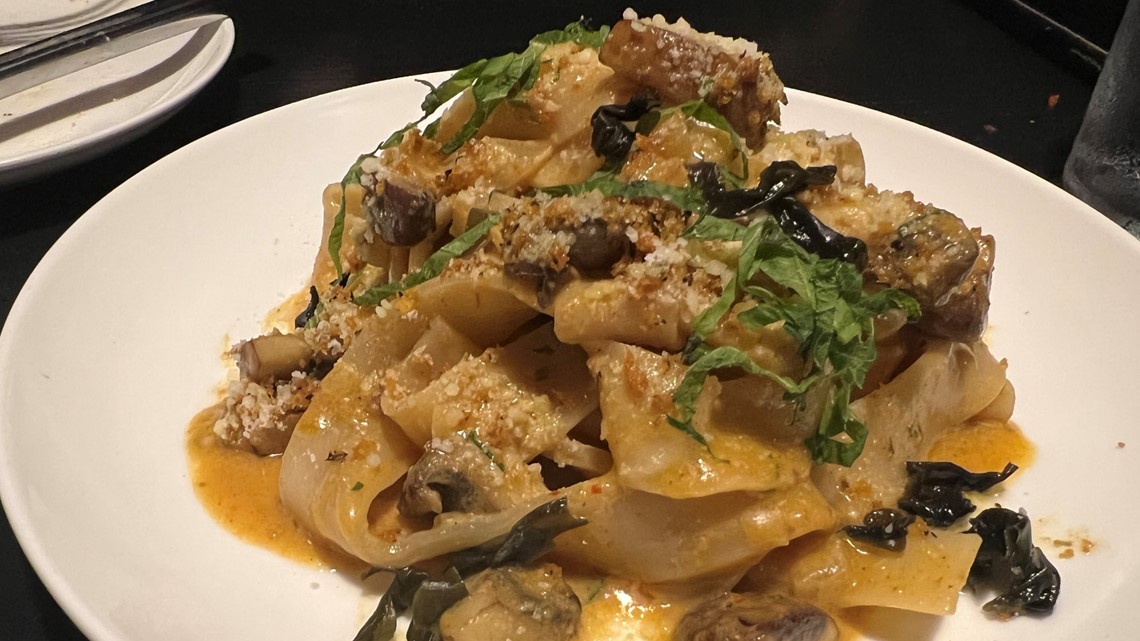
That enthusiasm was tested when Tonari first opened its doors in 2020. Months later the COVID-19 pandemic hit and the restaurant had to pivot, briefly offering take-away options, shutting down and eventually offering a tasting menu once doors opened again.
Now, Tonari is back to full strength, they have nixed the tasting menu and offer items a la carte. They were also just added to the 2022 edition of the D.C. Michelin Guide. From where Daisuke is standing, the accolades are not what this restaurant is about. The goal is not to get a Michelin star.
“Our goal is not to be a Michelin-star restaurant," he said. "Our goal is to get the word out on what people are eating in Japan now.”
That drive to get the word out is something shared by Nico Cezar, Chef de Cuisine at Tonari. Chef Nico is an alum of Michelin star Italian restaurant Masseria so he’s putting his background to good use.

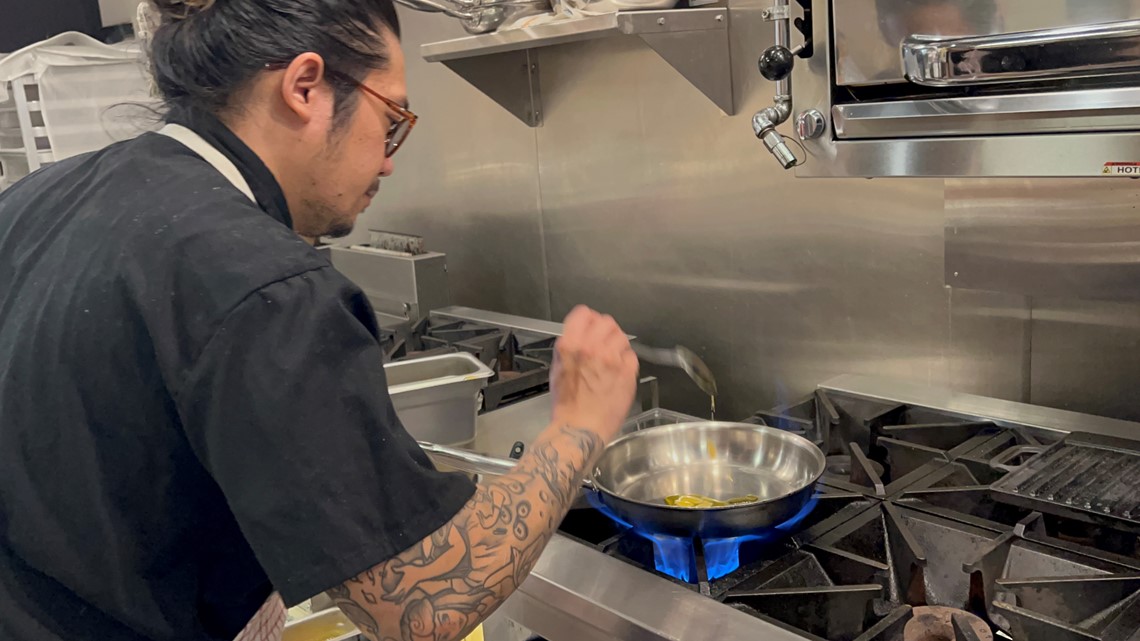
“It’s a blessing for me to be able to parallel my training under cooking Japanese food and cooking Italian food, which makes [wafu cooking] a little easier to approach because I know that I can use this ingredient, or that technique,"Cezar said. "It’s easier for me to approach it that way than sticking to classic Italian or classic Japanese. What we want to do is make sure that we are obeying this culture of food in Japan and introducing it to the world… Making them aware that there is such a thing as Japanese-style Italian food. We’re not trying to mash up things for the sake of fusing two cultures together, you want to make sure that it is paying homage to that culture-specific food style.”
While cooking the spaghetti napolitan, a dish that’s been on the menu since Tonari opened, the chef explains the importance of the noodles and the fresh ingredients used to bring the simple dish together.

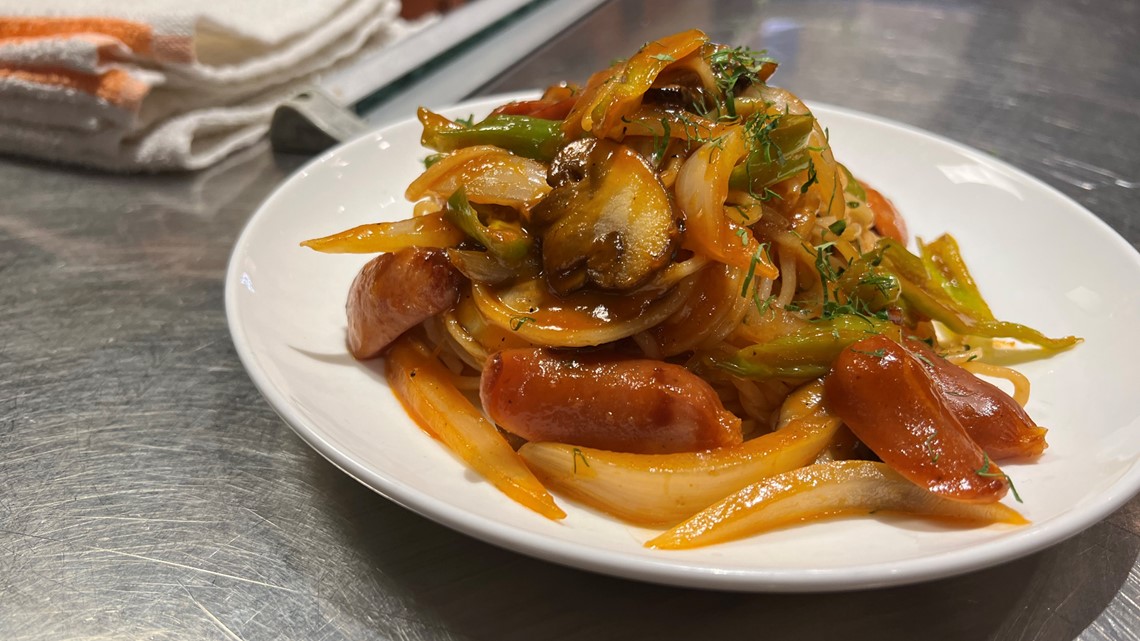
“I think it surprises people whenever they taste the dish, they’re like, ‘Oh it’s a ketchup spaghetti, how good could it be?’ It’s just how it’s put together," Cezar said. "Ordering product that’s at the height of its season. The best of what you can responsibly get. Something that’s sustainable. That’s something that I want to push forward to the menus that we have here, just making sure that we’re sticking to the same idea of representing Italian cooking and Japanese cooking… making sure that we’re paying respects in a respectable way without trying to reinvent the wheel. At the end of the day I want Japanese people to come in here and be like ‘Oh, this still makes sense. This restaurant is doing every preparation or technique justice and representing it well.'”
The menu, which Cezar would like to change every month, features some pizza and pasta combinations that may be daunting to some diners, but Cezar hopes that those who come to Tonari will be adventurous, and willing to try something new. For instance, the Mentaiko cream is a sauce made with cod roe. Right now, it's featured on both a pasta and a pizza on the menu.
As he loads a Mentaiko and corn pizza into the all-important pizza oven, he explains that the pie gets loaded with cheese, and that the cheese helps the pizza get ridiculously crispy in the pan.
“It’s almost like a corner of a lasagna, but everybody gets a corner piece,” he said.

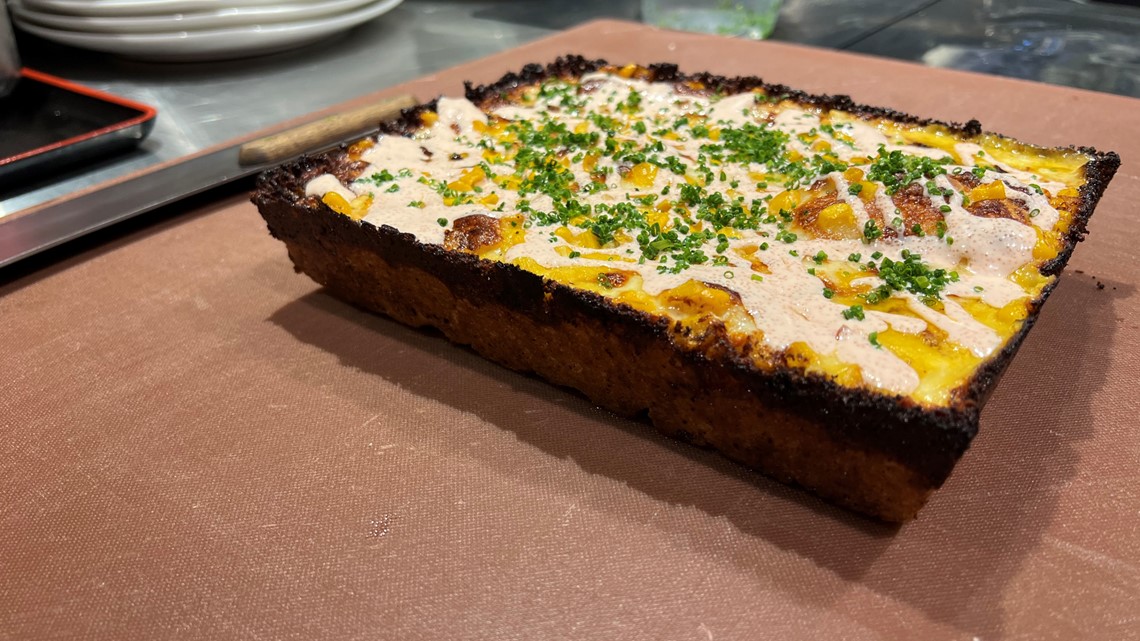
Cezar says developing new menu items and recipes can be challenging, but it’s something he enjoys.
“The beauty about learning Japanese-style cooking is you value subtraction as you go," the chef said. "You only use what you need, and that’s very hard for a chef to do.”
He said it goes back to the mission of getting the word out about wafu cuisine.
“How do you educate people is the hard part," Cezar said. "If you blindfold somebody they’ll think, ‘this is a pepperoni pizza.’ Yeah, but do you taste the intricacies of the ingredients that go into the sauce? That’s the challenge. I think we’ve done a good job. My hope is that, moving forward, we’ll have a lot more people curious to come and say, ‘I want to see what you guys are doing.'"

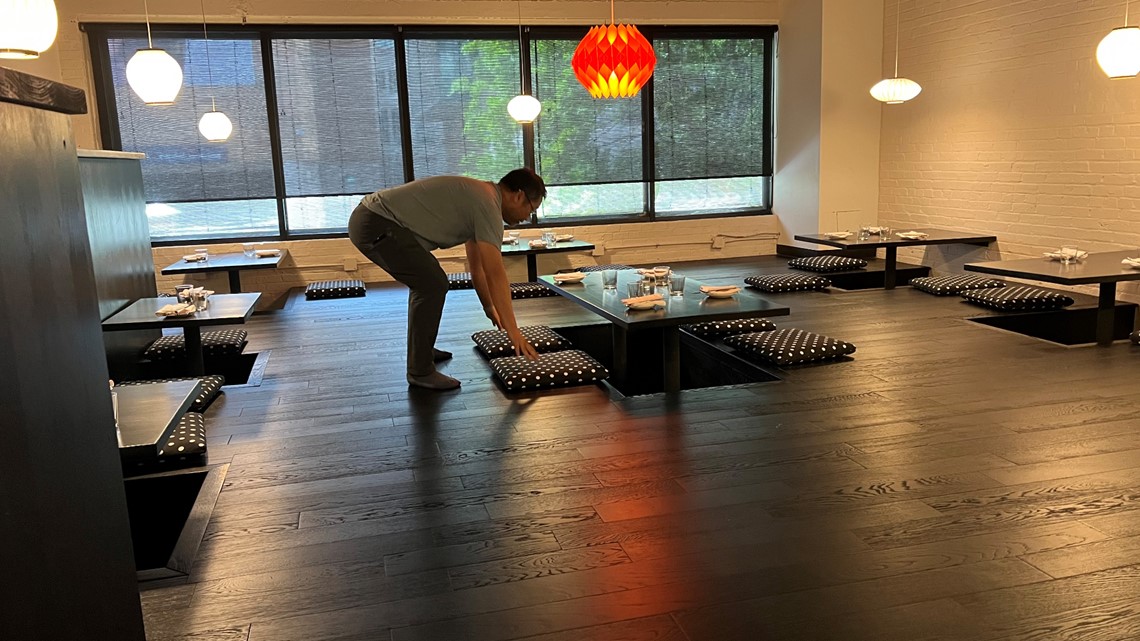
Visiting Tonari
707 6th Street Northwest
Monday & Tuesday - closed
Wednesday & Thursday - 5 pm to 9:30 pm
Friday and Saturday - 5 pm - 10 pm
Sunday - 5 pm - 9 pm

